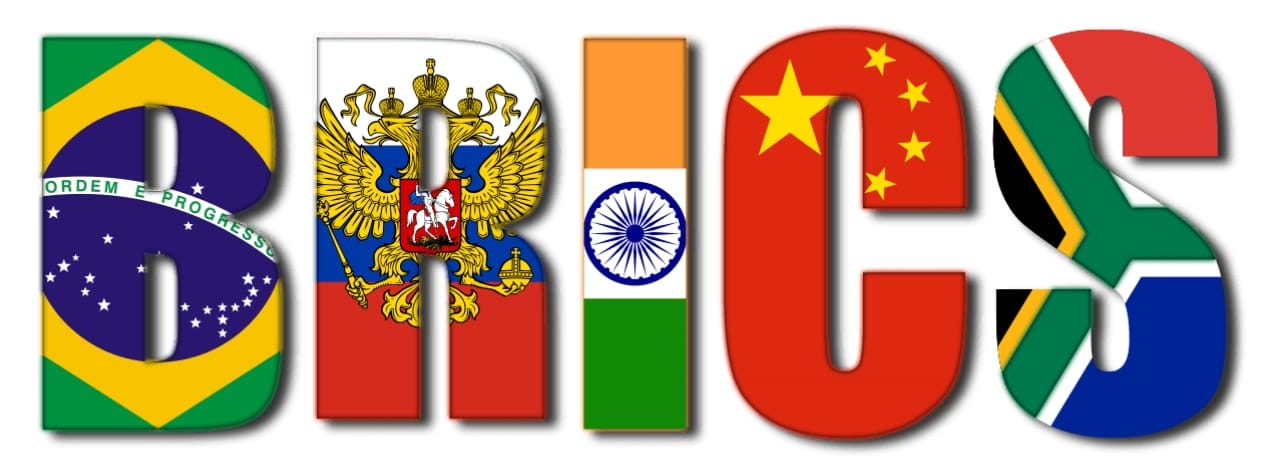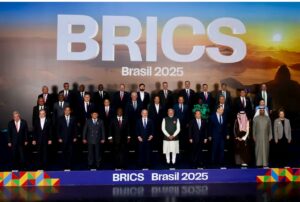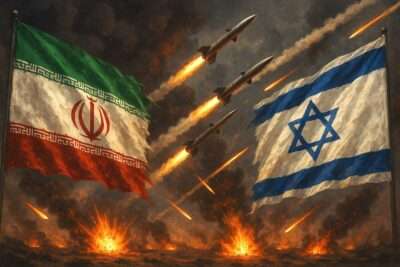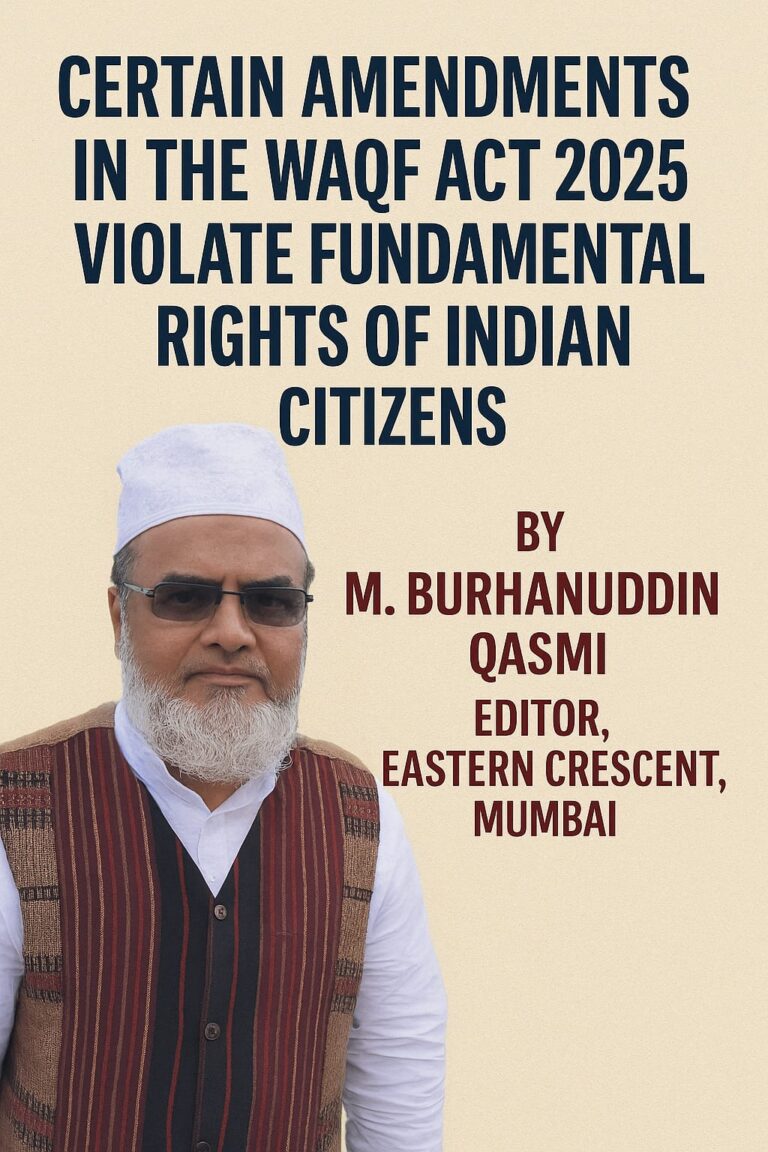
Reshaping the Global Order: BRICS and the Promise of a Multipolar Future World
Reshaping the Global Order: BRICS and the Promise of a Multipolar Future World
By M. Burhanuddin Qasmi
Editor: Eastern Crescent, Mumbai
For decades, the world has operated under a lopsided architecture of power, dominated by a few Western nations that have monopolized international institutions, shaped global narratives, and enforced policies that serve their own strategic interests. The rise of BRICS signals a transformative shift—one that holds the promise of a truly multipolar world order grounded in fairness, representation, and mutual respect.
Initially formed as BRIC in 2006, with Brazil, Russia, India, and China as founding members, the group evolved into BRICS with the inclusion of South Africa in 2010. Since then, the alliance has expanded dramatically, adding Egypt, Ethiopia, Iran, the United Arab Emirates, Saudi Arabia, and Indonesia as full members. Although Argentina was briefly accepted, it later withdrew. In 2025, BRICS further extended its reach by welcoming ten partner countries: Belarus, Bolivia, Kazakhstan, Nigeria, Malaysia, Thailand, Cuba, Vietnam, Uganda, and Uzbekistan. Together, these twenty-one nations represent a formidable coalition cutting across continents, cultures, and political systems.
The bloc’s economic and demographic footprint is staggering. BRICS nations account for nearly half of the global population, over thirty percent of the world’s oil production, and more than thirty-five percent of GDP when measured in purchasing power parity. Geographically, they span over thirty percent of the earth’s landmass. China and India alone offer immense economic weight, while resource-rich nations like Russia, Brazil, and the Gulf states add strategic depth.

Among the most ambitious goals of BRICS is the movement toward dedollarization. This initiative seeks to reduce global reliance on the U.S. dollar in cross-border trade and reserves—thus dismantling the grip of a single currency over world commerce. The dollar’s dominance has long enabled the United States to leverage sanctions, impose unilateral financial restrictions, and manipulate markets in favor of its geopolitical interests. A multipolar currency ecosystem, powered by national currencies and alternative frameworks such as the BRICS basket, promises a more balanced and resilient financial order.
The IMF, for instance, has imposed severe austerity measures on vulnerable nations under the pretext of economic assistance. These conditions often plunge recipient countries deeper into debt and poverty, while ensuring continued dependence on Western-led institutions. BRICS counters this structural inequity by supporting new financial institutions like the New Development Bank—ones that operate with greater inclusivity and fewer political strings attached.
Nowhere is the legacy of economic colonialism more evident than in France’s ongoing influence over African economies. The CFA franc, used by fourteen African nations, is minted in France and pegged to the euro, rendering these states monetarily subservient. France continues to extract uranium, gold, and other precious resources from its former colonies under highly skewed arrangements, securing billions in profits while the local populations remain impoverished. Such models of exploitation have no place in a reimagined world order.
Another stark illustration of global injustice lies in the treatment of the Muslim world. The fifty-seven Muslim-majority countries under the banner of the Organisation of Islamic Cooperation represent more than two billion people, command a substantial share of the oil market, and contribute trillions in global trade. Yet not a single Muslim country holds veto power at the United Nations Security Council, nor meaningful influence in institutions like the IMF or WHO. This absence from the decision-making core reflects a systemic bias that BRICS seeks to confront.
The veto system itself, instituted in 1945 after World War II, grants absolute power to only five nations: the United States, United Kingdom, France, Russia, and China. This undemocratic privilege has allowed these countries to override the collective will of the global community, often to shield allies or pursue narrow agendas. The repeated use of the U.S. veto to protect Israel—despite its ongoing occupation of Palestinian territories and widely documented human rights violations—has perpetuated decades of suffering and denied justice to millions. This veto-enabled impunity exemplifies how institutional structures have failed the very principles of democracy and human rights they claim to uphold.

A new global order demands new voices. Africa, South America, and the Middle East must be accorded their rightful place in shaping international policy. BRICS offers not just economic cooperation but a vision for global equity. It is a call to dismantle long-standing hierarchies, to end unilateralism, and to construct a world governed by shared values rather than strategic vetoes.
Whether this vision is realized depends on sustained commitment and unity among BRICS members, and their ability to counter pressures from entrenched powers. The path will be complex, but the promise of a multipolar future—a future where nations stand not in hierarchy but in partnership—is one worth pursuing.
You May Also Like
 Editorial
EditorialIndia Should Rebalance Its Neighborhood Diplomacy
India Should Rebalance Its Neighborhood Diplomacy By: M. Burhanuddin Qasmi Editor: Eastern Crescent, Mumbai...
 Editorial
EditorialOpposing Films is Part of Promotion
Opposing Films is Part of Promotion By: M. Burhanuddin Qasmi Editor: Eastern Crescent, Mumbai...
 Editorial
EditorialThank You, Bihar!
Thank You, Bihar! By: M. Burhanuddin Qasmi Editor: Eastern Crescent, Mumbai What an unforgettable...
 Editorial
EditorialThe World Must Be Alarmed!
The World Must Be Alarmed! By: M. Burhanuddin Qasmi The incident yesterday in the...
 Editorial
EditorialThe Misbegotten Lexicon
The Misbegotten Lexicon By: M. Burhanuddin Qasmi Editor: Eastern Crescent Behold, the lamentable chronicle...
 Editorial
EditorialCertain Amendments in the Waqf Act 2025 Violate Fundamental Rights of Indian Citizens
Certain Amendments in the Waqf Act 2025 Violate Fundamental Rights of Indian Citizens By:...

Comments (10)
Leave a Comment
I'm curious to find out what blog platform you happen to be using? I'm experiencing some minor security problems with my latest website and I would like to find something more secure. Do you have any recommendations?
Hiya, I'm really glad I've found this info. Today bloggers publish only about gossips and internet and this is actually annoying. A good website with exciting content, this is what I need. Thank you for keeping this site, I'll be visiting it. Do you do newsletters? Cant find it.
You actually make it appear really easy with your presentation but I to find this matter to be actually one thing which I believe I might never understand. It sort of feels too complex and very broad for me. I'm looking ahead on your next submit, I¦ll try to get the hold of it!
I needed to put you one little bit of note to finally thank you very much once again regarding the nice solutions you've provided on this website. It's simply wonderfully generous of people like you to present extensively all most of us would have offered for an e-book to help with making some money for themselves, and in particular given that you might have tried it if you ever considered necessary. The creative ideas also served as the easy way to be certain that other individuals have a similar passion much like my very own to grasp very much more on the subject of this problem. I know there are lots of more enjoyable moments ahead for many who start reading your blog.
Hi, i think that i noticed you visited my site thus i came to “go back the favor”.I am attempting to in finding things to enhance my website!I suppose its good enough to make use of a few of your ideas!!
I like what you guys are up also. Such smart work and reporting! Carry on the superb works guys I’ve incorporated you guys to my blogroll. I think it'll improve the value of my website :)
Nice post. I was checking continuously this blog and I am impressed! Very helpful information specially the last part :) I care for such information a lot. I was seeking this particular information for a long time. Thank you and best of luck.
Keep up the wonderful work, I read few blog posts on this internet site and I conceive that your site is really interesting and has sets of superb information.
An fascinating discussion is price comment. I think that you need to write more on this matter, it might not be a taboo subject but usually persons are not enough to speak on such topics. To the next. Cheers
I don't think the title of your article matches the content lol. Just kidding, mainly because I had some doubts after reading the article.